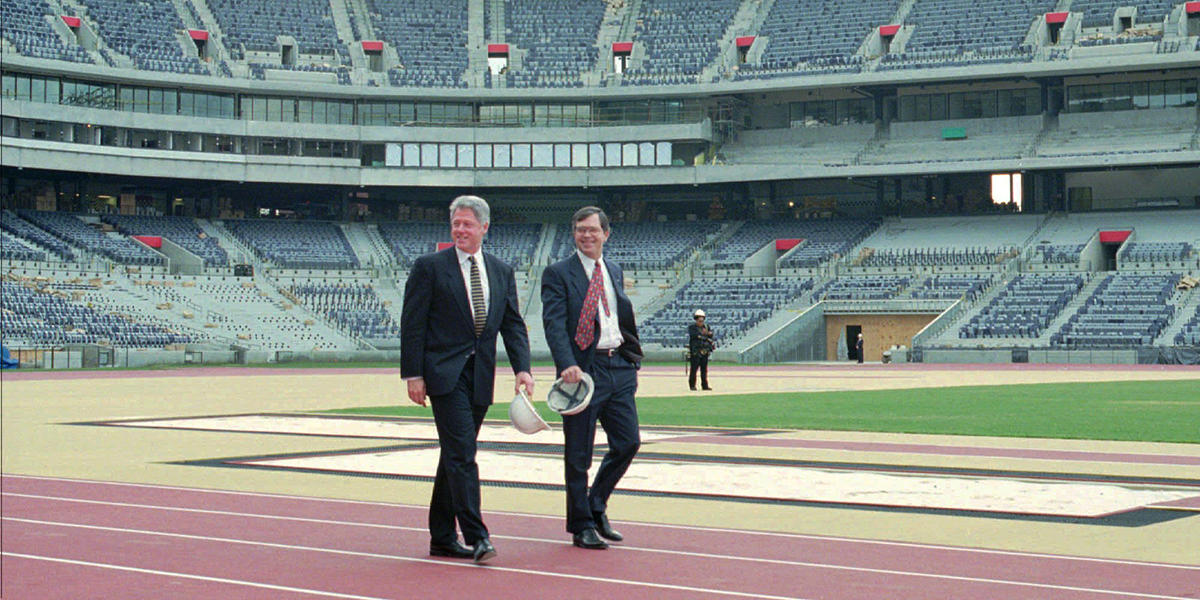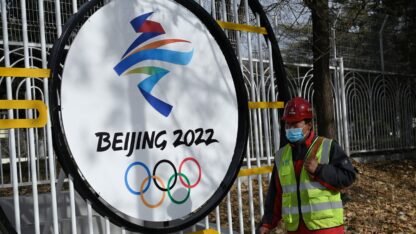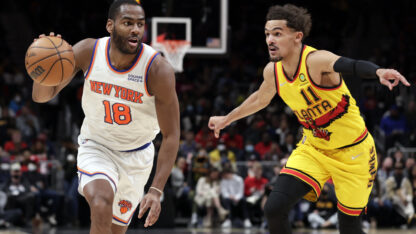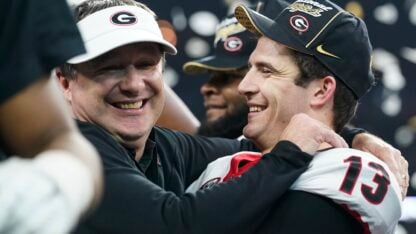This story is part of “Atlanta Remembers: The 1996 Olympics,” WABE’s series on the impact of the 1996 Summer Olympics on Atlanta, 20 years later. For more stories, click here.
William Porter “Billy” Payne served as Chief Executive Officer of the Atlanta Committee for the 1996 Olympic Games. He is better known, though, as the Atlanta Games’ “father.” He sat down with WABE’s Lisa George to talk about the genesis of bringing the games here.
Q: How did the idea of bringing the Olympics to Atlanta come to you in the first place?
A: (Laughs) My wife says that I was a bored, overworked, unhappy lawyer and looking for a project. I think, as we all do, we go through a period of thinking that we can do more, involve more people, have more fun, take on these community endeavors.
Q: Andrew Young said that you had gotten such satisfaction over a development project at your church in Dunwoody that this seemed like a logical step to you as the next one.
A: (Laughs) Well, I don’t know that it was very logical. I had chaired a campaign to raise money to build a new sanctuary, and it really felt good. I saw this collective effort, and I think that set me to dreaming.
The next day, when I went to my office after that church experience and starting thinking about the day before, I literally went through an entire legal pad, writing down, you know, “Super Bowl,” “political convention,” “World’s Fair.”
I hit “Olympics,” and I didn’t know anything about the Olympics. But as a former athlete, I think the sportsman part of it, the athletic part of it, I guess, attracted me. And so, I went back through the trash can of all the wrinkled-up pieces of my legal pad, and I pulled out the one that said “Olympics,” and off we go.
Q: I was a reporter in Albany, Georgia, in the late ’80s. And you visited one of our civic clubs and gave a speech about how you were going to bring the Olympics to Atlanta. And if I remember correctly, the reaction was polite applause and not much more.
A: (Laughs) I can remember, in the early days, people, they were just trying so hard not to laugh at me. But you know, who could have a better partner than Andrew Young? He has a way of making dreams become a reality. He’s lived a life doing that. And, you know, the whole time we were doing this, and I was this naïve young man doing something that I had no idea how to do, I was learning every single day from Andy Young. He brings all of the qualifications you could possibly need for a[n] international community effort.
The 1996 Olympics: Putting Atlanta On Global Stage
Q: What was your biggest challenge in putting things together to put together the proposal for the games?
A: No one had really heard of Atlanta. People knew Atlanta only [as] Civil War, civil rights. While both of those are important parts of our culture, people did not know the friendliness and the welcoming and the hospitality of the people of the American South was indeed different from what they had encountered throughout the rest of our great country.
Q: When the announcement came, what was your first reaction?
A: Relief. It had been a long three-year, I think, effort. And I was mentally, physically, totally, completely, not enough descriptive words, exhausted. And I remember thinking right before he [International Olympic Committee President Juan Antonio Samaranch] made the famous announcement, “Just say something; just get it over with” (laughs). So I was just glad it was over.
Q: Was there ever a point when you were putting together the games that you thought, “This might not happen,” or “We have a problem here that may be insurmountable”?
A: Every day was an exercise in prioritizing the things that needed to be done and done first. So you just make it happen.
1996 Atlanta Olympic Venues: Where Are They Now?
Q: Is there anything that you wish you’d done differently in the preparation?
A: No, I don’t think in the preparation. I think clearly, in the games, of course, the tragedy of the park bombing is something that, you know, we would do anything to have gone away and never happened. But in terms of doing something affirmatively differently, no, I don’t think we would have.
Q: Understandably, that was the lowest moment during the days of the games for everyone. What was your fondest moment of the games?
A: There’s a tie. Number one: the opening ceremonies. Being reminded, even recently with the death of our hero, Muhammad Ali, the moment that he lit our torch in such a magnificent moment, a wonderful tribute to an absolutely incredible athlete.
And second, while I mention that the greatest tragedy, of course, was the park bombing, when we reopened the park, tens of thousands people who were there saying, rather defiantly, that notwithstanding this great tragedy, nothing, nothing is going to stop this wonderful celebration of humanity during the Olympic Games and specifically in this park. And to see Andy Young preach to all of those people was just [a] magnificent moment and a very proud moment for Atlanta.
Billy Payne currently serves as Chairman of Augusta National Golf Club and as Chairman of Centennial Holdings, a real estate investment firm in Atlanta.










